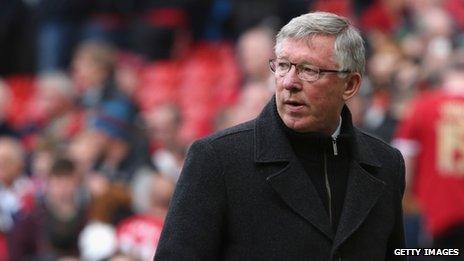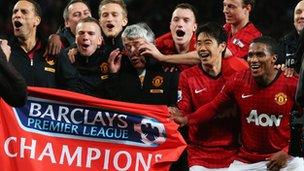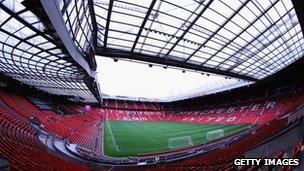Sir Alex Ferguson's retirement: Will it hurt Man Utd?
- Published

Sir Alex Ferguson is vacating the Old Trafford dugout after nearly 27 years
During nearly 27 years at the helm of Manchester United, Sir Alex Ferguson has seen a number of seismic financial changes at the Old Trafford club, which he is leaving at the end of this season.
The club has gone from the days of the Edwards family's ownership in the 1980s and 1990s, to the stock market flotation in 1991 and subsequent sizeable investment by Irish businessmen JP McManus and John Magnier, to the controversial and debt-driven takeover by the Glazers in 2005.
Along the way, there have been a number of high-profile, but abortive attempts to take over the club: by Michael Knighton in 1989, BSkyB in 1999 and the Red Knights in 2010.
But what impact will Sir Alex's own retirement now have on the football business at Old Trafford? He leaves an outfit that plays in Manchester, is owned by Americans, is registered in the Cayman Islands and has sponsors in Europe, Africa, Asia and the Middle East.
"The retirement of great leaders like Sir Alex Ferguson usually results in great uncertainty for organisations, and tough challengers for the leaders' successors," says Andre Spicer, professor of organisational behaviour at Cass Business School.
"Typically, the retiring leader casts a shadow over the whole organisation for many years."
Bond and flotation
However, if his departure leaves uncertainty over the playing field, it could be argued that his successor will be joining an organisation in a healthier financial state than the one Sir Alex had to deal with following that takeover by the Glazer family eight years ago.
The highly-leveraged £800m deal left the club's parent company with sizeable debts, which had swelled to £716.5m by 2009.

Man Utd had this year's title sewn up before the end of the season
Fans' groups, such as the Manchester United Supporters Trust - which launched its famous green-and-gold campaign to try to oust the Glazers - were left angry that millions were going on interest repayments every year that could have been spent on players.
However, since then, there has been a concerted effort by the Glazers to drive down debt, with a bond issue in 2010 raising £500m, and a 10% flotation of the club on the New York Stock Exchange raising some £150m, with half of that going towards the debt pile.
Despite those rocky years, in his farewell statement, Sir Alex, who took up the manager's reins in late 1986, praised the Glazers - and the departing chief executive David Gill (who is being replaced by executive vice-chairman Ed Woodward) - for their financial support since acquiring their first stake in 2003.
"Over the past decade, the Glazer family have provided me with the platform to manage Manchester United to the best of my ability and I have been extremely fortunate to have worked with a talented and trustworthy chief executive in David Gill," said the 71-year-old.
During the Ferguson years United have, according to Dan Jones, head of the sports business unit at Deloitte, become "one of, if not the, biggest brands in world football", and the the top revenue generating club in England.
Commercial strategy
And another sports business expert says that, however much it may have angered fans along the way, the Glazers' business plan appears to be working.
"The point with the finances is that they were highly leveraged, but that debt has been coming down, and year on year, the repayments are becoming lower," says Harry Philp, football finance expert at Portland Advisors.
"Commercial revenue has been going through the roof recently, thanks to this continued strategy to segment the commercial partners - seeking different sponsors in different countries in different markets."
An example of this can be seen in the last quarterly results, released last week, when the club - which boasts more than 650 million fans - said it had signed three new deals during the quarter, with Japanese social gaming firm Gloops, Danish financial services firm Ekspress Bank and Vietnam's BIDV.
Indeed, the club's website currently shows 33 sponsors from around the globe.
Those latest financial results mentioned above saw the club post a record £91.7m ($143m) in sales for the third quarter, helped by sponsorship deals and Champions League revenues.

Sir Alex's successor will enjoy a state-of-the-art 75,000 capacity stadium
Commercial sales grew 32% in the third quarter compared with the same period last year. Sponsorship deals brought in £21m for the club, a 52% increase, while revenue from retail, merchandising and mobile devices also grew. Club debt now stands at £367m.
"The implication of all this is that the amount of money available for spending on transfers and wages is growing as the debt is coming down," adds Mr Philp.
And he says the new £3bn Premier League TV deal, which kicks in next season, will also enrich the club coffers.
Asian market
A posting earlier this year by Andy Green, who runs the acclaimed Andersred blog, which has scrutinised the club's finances for a number of years, makes much the same point.
"A combination of unexpectedly high growth in TV deals, new commercial revenues (especially new shirt and kit deals), the impact of new regulation on the behaviour of other clubs and the pay-down of significant bond debt means we are entering a new phase in United's finances, where it is very possible that debt is virtually eliminated in the next few years," he observed earlier this year.

The club will look for continued success to hold onto its young Asian fans
Mr Philp says this was always the strategic aim of the Glazers when they took over the club, adding that they "have delivered on that strategy".
He also says that Manchester United has a state-of-the-art stadium and training ground, so there is no huge spending hole there for Sir Alex's successor in the future.
However, he points out that all the global commercial developments would not be happening if the team, which carried off the Premier League title this season, was not such a continued playing success.
"All the commercial activity is predicated on their being a successful playing side for some time to come," he says, adding that this is particularly true in overseas markets such as east and south-east Asia.
"I think in the short term, overseas fans will stick with the club, but this is where the central aspect of playing success comes in. As younger fans in these overseas markets are coming up, if Man City and Chelsea become the dominant teams, then these new fans might turn to them.
"But there is already a pretty decent squad there at Old Trafford. It now needs to take the next step and become successful on the European stage."